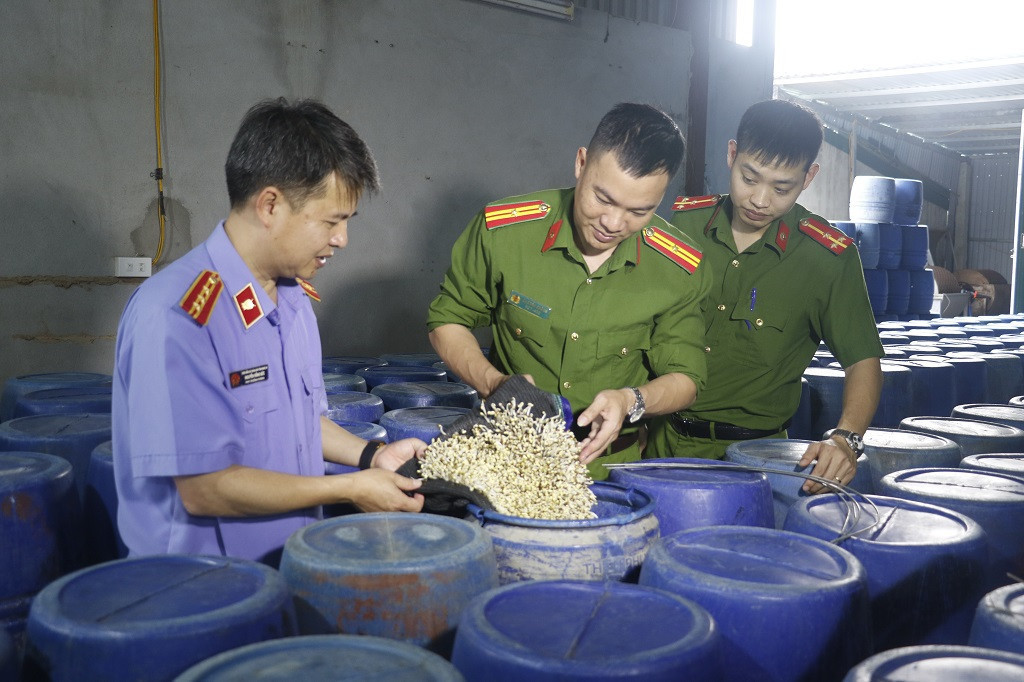
The Ministry of Public Security's (MPS) Investigation Agency has recently prosecuted and detained Nguyen Thuc Thuy Tien (Miss Grand International 2021) for "deceiving customers" under Clause 2, Article 198 of the Penal Code, acting as an accomplice with individuals from Chi Em Rot Group JSC.
Other prominent figures have also been arrested in the case, including Pham Quang Linh (Quang Linh Vlogs), a board member, and Nguyen Thi Thai Hang (Hang Du Muc), Chair of Chi Em Rot Group JSC's board.
In mid-April, Nghe An authorities detained four facility owners for soaking bean sprouts in the toxic chemical 6-Benzylaminopurine. From 2024 until their arrest, these facilities produced and sold 3,500 tons of chemically treated bean sprouts.
Also in April, MPS dismantled a large-scale operation producing nearly 600 types of fake milk, generating nearly VND500 billion in revenue, at Rance Pharma JSC and Hacofood Group JSC. These fake milk products targeted people with diabetes, kidney issues, premature infants, and pregnant women.
Public shock persisted as Phu Tho Police raided Famimoto Vietnam Co, seizing over 71,000 liters of fake cooking oil, 40 tons of fake MSG, 22 tons of fake seasoning powder, 9 tons of fake mixed seasoning powder, and nearly 84 tons of additives used to produce these counterfeit goods.
At the same time, authorities uncovered Herbitech Technology Co. producing fake health supplements for children, such as BABY SHARK and Medi Kid Calcium K2. This company processed over 200 products worth hundreds of billions of dong, but doesn’t control quality. Despite claims of imports from France, Germany, and the US, the products' cost and quality did not match their claims.
What is happening with watchdog agencies?
Fake and contaminated food flooding the market has left consumers anxious. These products infiltrate store chains, major supermarkets, and even hospitals. They are promoted by celebrities through livestreams on social media.
A question has been raised about how such enterprises can smuggle and make hundreds of tons of counterfeit goods in front of state management agencies. To do this, enterprises must set up warehouses, and carry out buying/selling and transportation activities, which must be discovered by the agencies.
Amid these alarming developments, Prime Minister Pham Minh Chinh stated there are two possibilities. First is the agencies’ lack of will to combat fake goods. Second, they are bought off. And in both cases, they must be strictly handled.
The Government has requested to design reasonable policies to handle the urgent issues that are currently being raised, clearly defining the responsibilities of the agencies, the close coordination between the Ministry of Health (MOH), the Ministry of Industry and Trade (MOIT), the Ministry of Agriculture and Environment (MAE) and relevant ministries and branches in food safety management.
The policies must be designed in a way to avoid overlapping or omission of tasks, not to leave any gaps in state management. The policies must be urgently designed and draft regulations must be submitted to the National Assembly as soon as possible.
Bui Thi An, former National Assembly Deputy and member of the Science, Technology, and Environment Committee, said the PM’s call for a special task force and a crackdown on fake and smuggled goods is a necessity. It is necessary to clearly define responsibilities of each agency and individual.
There are many agencies in charge of food safety management in Vietnam, from central to local levels and responsibilities among ministries are clearly defined. Yet, fake and contaminated food remains rampant.
Bui Thi An said that this issue isn't new but has festered for a long time, not in small quantities but on a massive scale.
This shows that authorities have been lax in managing, inspecting, and controlling product quality.
"We must review and rectify management, inspection, and control activities," An said. These should be regular, periodic, with clear responsibilities for local leaders and organizations.
"Though responsibilities are clearly divided, there's still overlap among ministries and branches," Bui Thi An noted.
She argued that “multiple sectors managing a single plate of food” is unacceptable. One lead agency should handle it. If expertise is lacking in any area, specialists can be brought in.
On post-market inspection, An said ethical businesses self-monitor and are honest about product quality, while others chase profits, leading to rampant fake and contaminated food, with consumers bearing the consequences. Thus, both pre- and post-market inspections are crucial.
Tam An